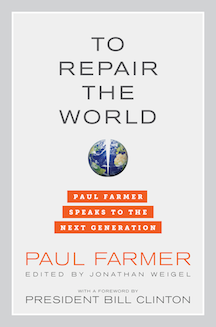In this collection of commencement speeches at prestigious medical schools, schools of public health and at other public venues, the reader learns of the achievements of one man and how his efforts in partnership with different organizations, local authorities, and communities can change the world to make it a better place. The energy and passion Paul Farmer invested as an advocate for patients in some of the poorest regions on earth shine through the pages of this inspiring book. But Farmer is not just an advocate, he is first and foremost a physician and teacher who actually provides health care on the ground, seeking and often finding practical solutions to daunting problems.
With great modesty but with dedication and a clear, forceful vision of social justice and global health, the author delivers the same message to the next generation of caregivers by telling different real-life stories through which the scope of his efforts comes to the fore. While still a student at Harvard Medical School, Farmer’s work with Ophelia Dahl in a squatter settlement in rural Haiti served as a prelude to Partners In Health, a non-profit healthcare organization they founded in 1987 together with Thomas J. White, Todd McCormack, and Jim Yong Kim. Their goal is “to bring the benefits of modern medical science to those most in need of them and to serve as an antidote to despair.” Their organization today works in twelve countries around the world. The model adopted for its operation is to remove clinical and community barriers to care, as diagnosis and treatment are declared a public good and made available free of charge to patients living in poverty.
From Haiti to Rwanda, Peru and Russia, Farmer’s successes can be credited to his combining high tech with high touch, bringing modern medicine to combat AIDS, malaria, and multidrug-resistant tuberculosis in under-privileged areas while building an infrastructure to make it work through cooperation and partnerships. One key ingredient is what he calls “accompaniment,” contrasting the term with mere “aid” insofar as accompaniment is about sticking with a task until it is deemed completed by the person being accompanied. It entails radical availability.
When patients become clients or consumers, and medical care an industry or private enterprise, Farmer’s wakeup call to remind us that primary health care should be a basic human right is a welcome sign of hope, as the poor with no purchasing power bear the greatest burden of disease. Countering “failures of imagination,” he deplores unethical claims resulting from flawed cost-effectiveness analyses, disproving their conclusion as AIDS drugs dropped in cost and proved more effective than initially thought, also working for prevention.
Concerns for global health are not limited to the delivery of health care, since large-scale social forces often determine who gets sick and who has access to care. Viewing the bigger picture is perhaps best illustrated by the challenges posed by the cholera epidemic that struck Haiti after the earthquake disaster. Strong public-sector water and sanitation systems are vital to halt transmission of waterborne pathogens claiming many lives among the poor, especially among children. Access to safe drinking water, education, and health care are basic human rights that Farmer and Partners In Health are fighting for.
Although the speeches in this book are addressed to graduates in the medical field, they are an inspiration to every one of us who can, in our own small steps, contribute to bring greater equity to the world and lessen unnecessary suffering in our communities.
Germaine Cornelissen-Guillaume is a professor of integrative biology and physiology and director of the Halberg Chronobiology Center at the University of Minnesota, Twin Cities.




